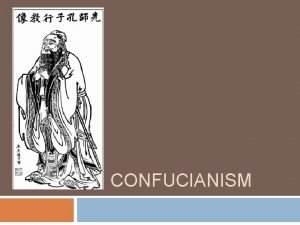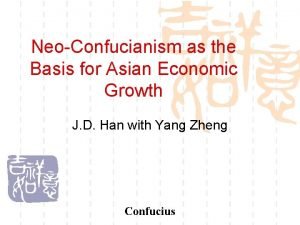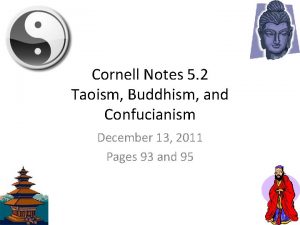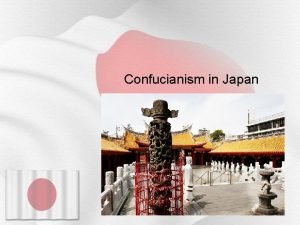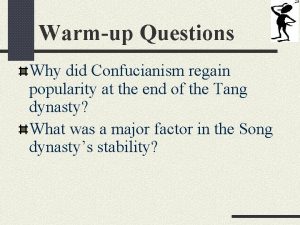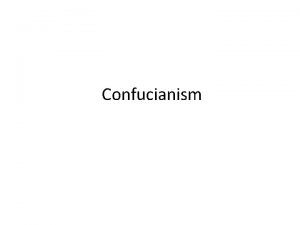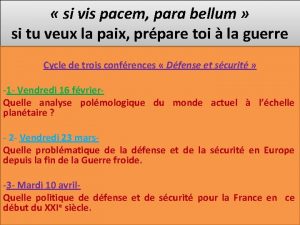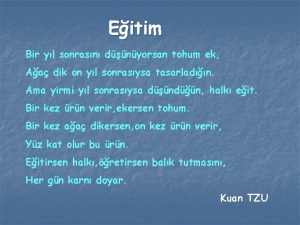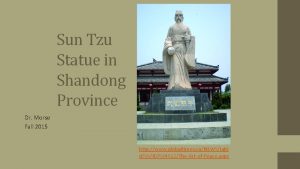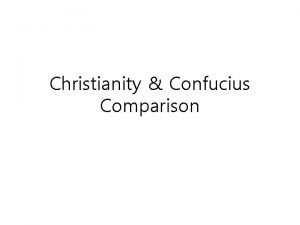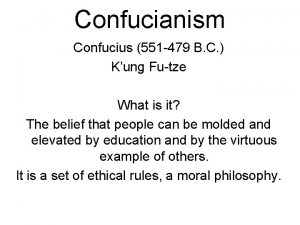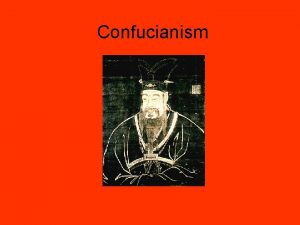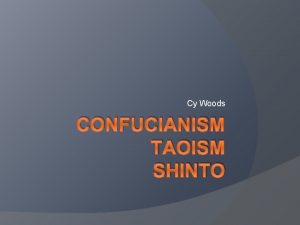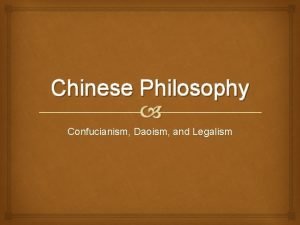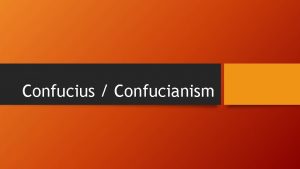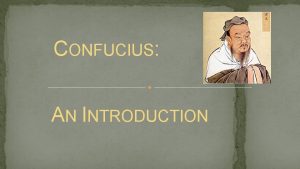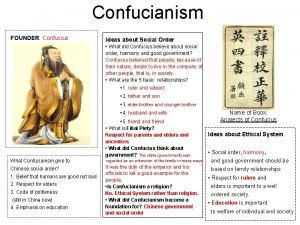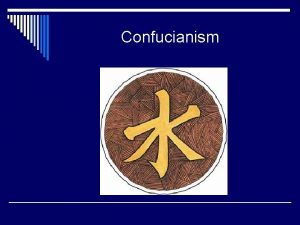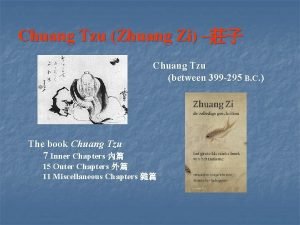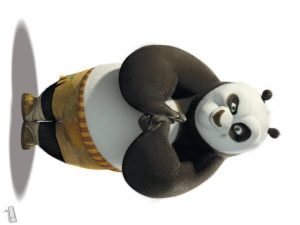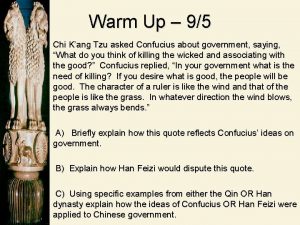Confucianism Confucius Founder Confucius Kung Fu Tzu Also
















- Slides: 16

Confucianism

Confucius ● Founder: Confucius (K’ung Fu Tzu) ● Also known as Kongzi ● Through of during the Warring States period ● He believed in Tian- an unpredictable power of morality ● 551 -479 B. C. E

Beliefs ● Most of the beliefs were organized in the eastern part of China ● Warring States-if everyone fixes their relationships the country will repair itself ● Your well being is affected by the well being of others ● Natural disasters happen because of moral behavior and punishment ● Believe in afterlife, but wasn’t seen as their main focus

5 Basic Principles ● ● Ruler to subject (loyalty) Father to son (filial piety) Husband to wife (love and obedience) Older brother to younger brother (brotherliness) ● Friend to friend (faithfulness)

Worship ● The Analects- Showed thoughts and conversations with Confucius ● Prayed and meditated to the Yijing ○ yin and yang ● Ancestral worship

Turning Points 1. Qin Dynasty 2. Han Dynasty 3. May Fourth Movement 4. Mao Zedong coming to power

Qin Dynasty ● The dynasty right after the Warring States Period ● Legalism-reaction to Confucianism ● Confucianism books were destroyed ● Scholars were punished for their beliefs

Han Dynasty ● Starting in 140 BCE China encouraged Confucianism o other societies did not approve of this ● Education was available for boys and some girls ● This gained state support

Worship ● Kept genealogical records (new form of ancestor worship) ● Made ancestral temples o part of everyday life ● Metaphysics-branch of philosophy that deals with understanding abstract ideas ● Had to deal with Christian missionaries trying to convert them

May Fourth Movement ● In 1919 China’s colonial possessions were given to Japan in the Treaty of Versailles o Including Kongzi’s birthplace ● This movement included protests that won Shandong back ● Many leaders argued for the wholesale abandonment of Confucianism

Communism in China ● Persecuted by Mao Zedong for ancestor worship o o burned altars and ancestral tablets could no longer bury dead-cremation ● Ancestor worship still censored today

Modern Confucianism ● Aka New Confucianism ● Blammed for China’s inability to compete with the West ● Praised as the key to China’s unique cultural heritage and strong social order

Changes in Beliefs and Worship ● Worship at home altars, family temples, and public places of worship ● Some modern Christians, apply the Confucianism philosophy to their religion ● Confucianism has now spread from mainland China to the West o ex: the United States

Continuities in Belief and Worship ● ● Still use genealogical records today Metaphysical traditions continued Still believe in Tian Confucians still emphasize the need of the Five Basic Principles/Relationships that Confucius came up with

Followers Difficult to determine how many followers o ranges from 10 to 350 million

Bibliography http: //www. patheos. com/Library/Confucianism. html http: //www. travelchinaguide. com/intro/religion/confucianism/ http: //www. britannica. com/EBchecked/topic/132104/Confucianism http: //worldreligions. weebly. com/confucianism. html
 Futzu
Futzu Wen in confucianism
Wen in confucianism 杜維明
杜維明 Neo confucianism vs confucianism
Neo confucianism vs confucianism Neo confucianism vs confucianism
Neo confucianism vs confucianism Neo confucianism vs confucianism
Neo confucianism vs confucianism What was a goal of confucianism?
What was a goal of confucianism? Manca warni tegese
Manca warni tegese Eto na ang magkapatid nag-uunahang pumanhik
Eto na ang magkapatid nag-uunahang pumanhik Youtzu
Youtzu Menaakul meaning
Menaakul meaning Qui veut la paix prépare la guerre sun tzu
Qui veut la paix prépare la guerre sun tzu Taoism principles
Taoism principles Kuan tzu
Kuan tzu Tzu chieh wei
Tzu chieh wei Statue of sun tzu
Statue of sun tzu Lao tzu water
Lao tzu water

